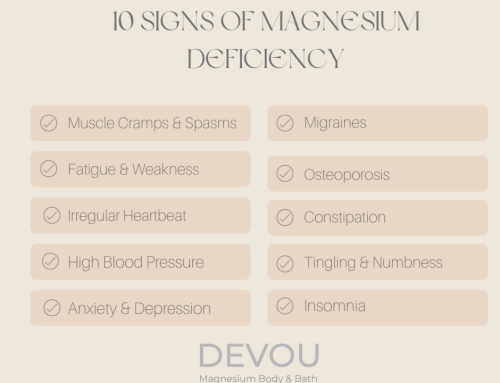Most likely not! According to the Australian Health Survey: Usual Nutrient Intakes 2011-12 – Australia, 1 in 3 over 2 years old did not meet their daily requirement of magnesium, those aged 14-18 61% of males and 71.6% of females did not meet recommendations. (1.)
The daily intake for a female 19 and above is 320mg per day, for a male it is 400mg per day. (2.) Outlined in the Australian Health Survey, those aged 19 plus, 33-63% depending on age and gender did not consume an adequate amount of magnesium. On average women consumed 260mg/day and men consumed on average 350mg per day. (1.)

This is rather concerning, the study outlined showed that for those older than 50, almost 50% of men and 30% of women do not consume enough and for those 71 years and older this increases further to 64% of men and 49% of women do not consume enough. Often this is where the deficiency of magnesium really starts to show up in numerous health conditions.
Concerning Fact
If you don’t consume enough magnesium daily your body will draw from your stores, that is, your bones and muscles to ensure it has enough in the blood to work with for optimal functioning. Magnesium is vital for over 330 processes in your body including circulatory health, heart function, nervous system, muscle and bone health, energy production, protein synthesis, glucose/insulin control and of course relaxation. (2.) Without accurate levels signs of depletion start to show.
Signs and symptoms of deficiency
Many signs of magnesium deficiency may be unnoticed and there are much on the list that you may relate to without realising you are in fact in deficit.
- Migraine Headaches
- Restless legs
- Muscle aches and pains
- Cramps
- Insulin resistance and impaired insulin sensitivity
- Heart conditions
- Joint pain
- Poor Circulation
- Muscle twitches
- Insomnia/sleep
- Irritability
- Stress/anxiety
Whilst the best option of course is to prevent deficiency is to improve your intake of foods containing magnesium, example nuts, seeds, leafy greens, avocado, dark chocolate, it is difficult to achieve. For the majority of people, those not consuming enough dietary magnesium, the National Health and Medical Research Council, recommends 5mg/kg/day of non food magnesium. (3.) You may be thinking where does Essential Magnesium come in, you can achieve this by eating well and using transdermal magnesium products.
Why Transdermal Magnesium?
Ever experienced the after affect of taking magnesium internally? Many will have had the dreaded upset stomachs and toilet visits. (3.) As a clinical nutritionist I also hear that many consume magnesium with little or no affect to there health due to their body’s inability to digest and convert the magnesium, so that the cells absorb and utilise it. Many forms may take 4-5 hours for you to get the magnesium from the tablet or powder or you may not absorb very much by the time it is converted to what the body can utilise.
The benefits of supplementing magnesium transdermally (through the skin) is that magnesium chloride (the form in our products) is utilised directly by the cells. Within 10-15 minutes the body has absorbed the magnesium and it is effective in the body’s cells. Research shows that supplementing via the skin can increase magnesium levels faster than powders and tablets. (3.)
By applying magnesium on a daily basis one can increase magnesium levels in the body and improve health and vitality. Applying magnesium to an area of bother can assist in relieving muscle and joint pain, calm and relax the body, improve sleep and restlessness, cramping, support muscle and joint growth and assist with irritability. Alternatively soaking in the bath weekly with magnesium bath flakes is another fantastic way of increasing the magnesium available in the body and improving your health and vitality.
Find out more by visiting our products page. If you have a question on how magnesium will benefit your health, please send me an email at questions@essentialmagensium.com.au.
Written by
Jenny Charlesworth, Clinical Nutritionist.
References:
- Australian Health Survey: Usual Nutrient Intakes 1011-12.
- Australian National and Medical Research Council, National Reference Values Australia & New Zealand
- Watkins K, Josling PD, A pilot study to determine the impact of transdermal magnesium treatment on serum levels and whole body CaMg ratios.



Leave A Comment